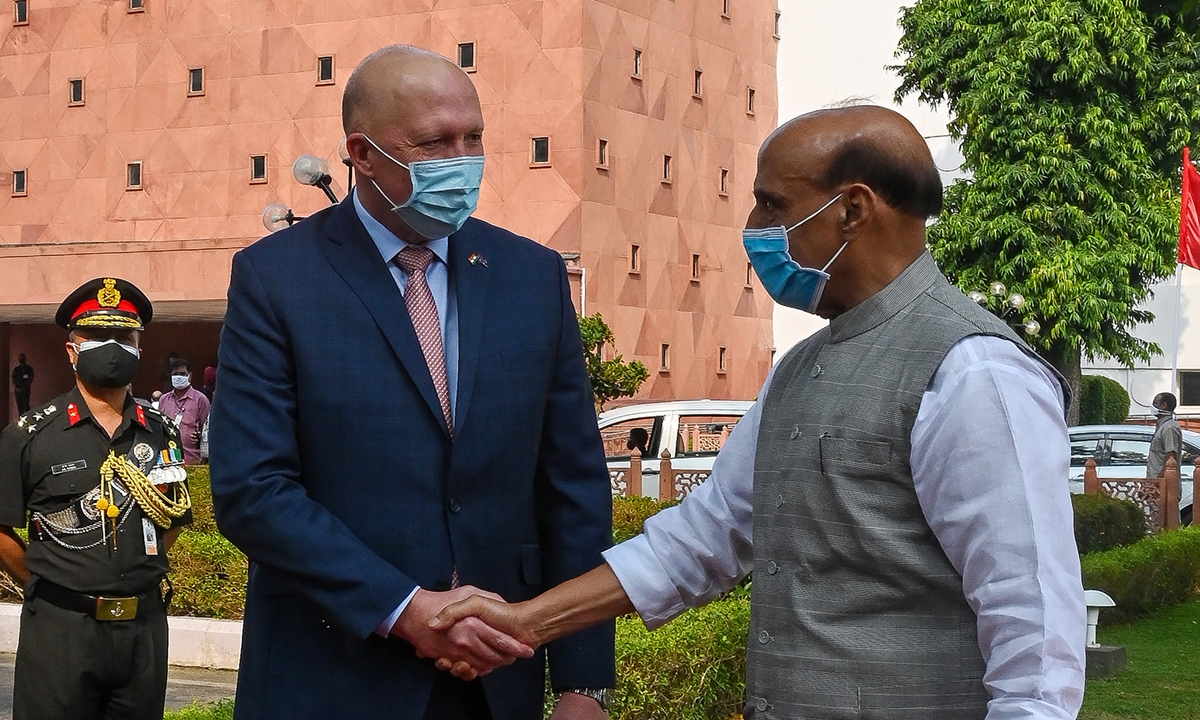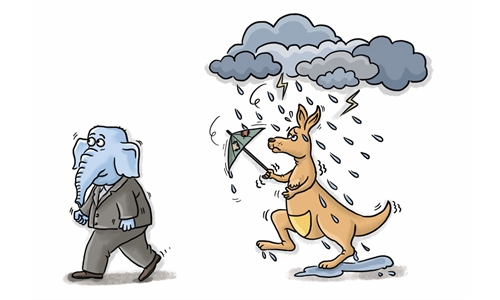
Australia's Defence Minister Peter Dutton (L) shakes hands with his Indian counterpart Rajnath Singh during a ceremonial reception in New Delhi on September 10, 2021. Photo: AFP
India and Australia on Saturday held a 2+2 Ministerial Dialogue in New Delhi. The statement released after the meeting indicates that the talks covered a wide range of issues, such as cooperation during the COVID-19 pandemic and the two countries' shared vision for regional issues including Myanmar and Afghanistan. The two sides also held extensive talks on the situation in the Indo-Pacific in the face of "China's growing muscle-flexing" in the region, people familiar with the talks were quoted as saying by India-based media outlet Mint.This was the first India-Australia "2+2" dialogue, a sign that the two countries are warming up to each other. India and Australia are geographically far apart. What has helped ramp up exchanges between the two countries is mainly the US-led Quad mechanism, in which India, Australia and Japan have proactively participated. The group has been seen as a force to counter and contain China. Under the mechanism, New Delhi and Canberra regard the so-called China threat as the main target of their security cooperation. The deterioration in their relations with China has reinforced the need to strengthen cooperation as well.
Within the Quad, Japan and Australia are traditional US allies, and India's ties with both the US and Japan have rapidly advanced, while relations between India and Australia are relatively distant. Many analysts view India-Australia ties as a "weak link" in the bloc. Furthermore, their bilateral relations touched a historic low in 1998, when Australia immediately suspended its defense cooperation with India following India's nuclear weapons test.
But driven by common interests and the perceived changes in the geopolitical situation, New Delhi and Canberra have discarded their old hatred and are attempting to move closer in the political, diplomatic, economic and military spheres.
Recent high-level interactions between India and Australia seem to have fleshed out the "weak link" of the Quad, which is what the US hopes to see. Washington will view it as further strengthening its anti-China group.
As their relations with China deteriorate, Australia and India hope more bilateral cooperation can help reduce their economic dependence on China. For example, former Australian prime minister Tony Abbott said in August that India was a "natural partner" for Australia and that the "answer to almost every question about China is India."
However, this is just wishful thinking by politicians in Canberra and New Delhi. The two countries do not have evident complementarities in their economies, and they are even competitors in terms of iron ore. When it comes to Australia's wine exports, even if a trade deal could be reached, given the limited capacity of India's domestic wine market, India cannot replace the huge China market.
"India and Australia will tend to carry out cooperation merely in the security field, such as maritime coordination, which has little to do with people's well-being. Even though their ties go deeper, it will be unbalanced - concentrating merely in politics, but little in economy," Qian Feng, director of the research department at the National Strategy Institute at Tsinghua University, told the Global Times.
Although how to deal with what they call the challenge from China is the main factor triggering India and Australia to move closer, there is nothing for China to worry about, Qian said. He noted that at most, Canberra and New Delhi may create some troubles for Beijing in the Indian Ocean. "As India lies in the north of the Indian Ocean, and Australia the south, their cooperation may pose a potential threat to China's maritime security, yet considering their size, the threat will be limited," Qian emphasized.

